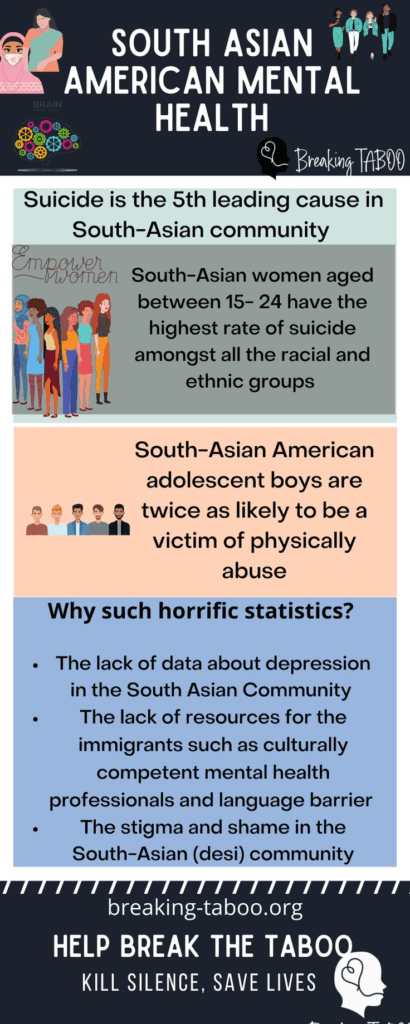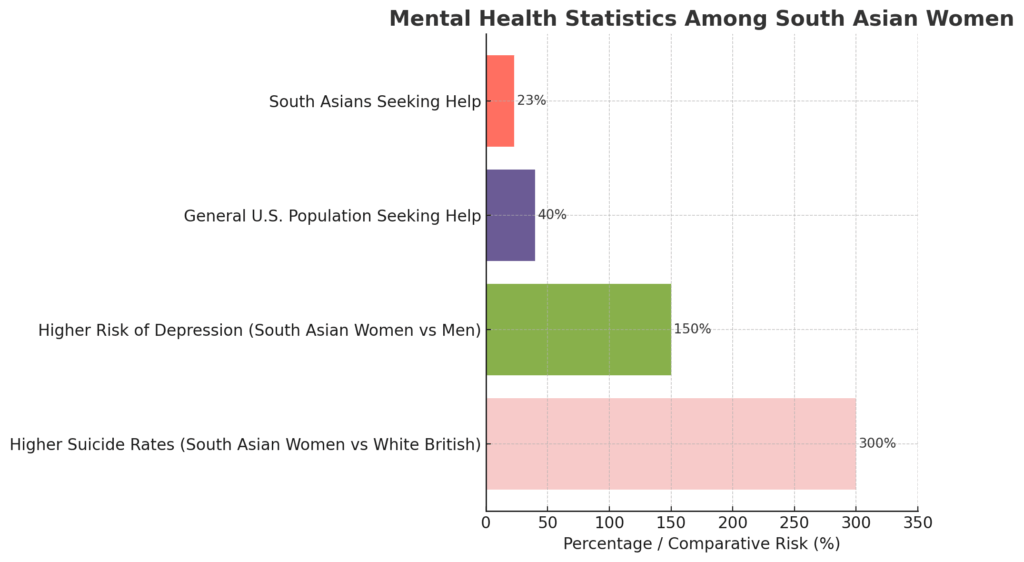
You would think that in a world as connected as ours, in a time where hashtags like #MentalHealthAwareness trend every other day, it would be easy for everyone to talk about what’s hurting inside. But for many South Asian women, it isn’t. It’s like being trapped in a glass box — you can see the world outside moving forward, embracing vulnerability, but your voice remains stuck in your throat.
It’s not because they don’t feel pain. It’s not because they don’t want help.
It’s because for generations, they’ve been taught that suffering in silence is strength.
Growing up, many South Asian girls hear phrases like:
- “What will people say?” (Log kya kahenge?)
- “Don’t talk about personal problems outside the home.”
- “We all have problems. You have to be strong.”
There’s a deep, invisible script written into their lives:
Be strong. Be dutiful. Be grateful. Don’t complain. Don’t make a scene. Don’t shame the family.
The Weight of Stigma: Statistics That Tell the Story

- According to the South Asian Public Health Association (SAPHA), only 23% of South Asians with a mental health disorder seek professional help, compared to 40% of the general U.S. population.
- A 2018 report found that South Asian women are at a higher risk for depression and anxiety compared to their male counterparts, yet they are less likely to receive proper diagnosis or treatment.
- Suicide rates among South Asian women aged 18–24 in the U.K. are three times higher than those of their white British peers, according to research by the University of Manchester.
These numbers don’t just speak — they scream.
But often, that scream is muffled behind closed doors.
Real Stories: Behind the Silence

Ayesha, 27, New York:
“I grew up thinking therapy was for people who couldn’t handle life. When I finally saw a therapist after years of battling depression, I didn’t tell my parents for months. When I did, they said, ‘We didn’t raise you to be weak.’ That broke me more than anything.”
Priya, 34, London:
“After my miscarriage, I fell into a deep depression. My mother told me to just pray more and ‘stay busy.’ I felt like my grief was a burden to everyone around me. It made me feel invisible.”
Nilofer, 22, Toronto:
“In our house, mental health didn’t exist. You were either normal or you were crazy — there was no in-between. I spent years believing I was broken.”
Why It’s So Hard to Speak Up
- Cultural Shame:
Mental health struggles are seen as a reflection of the family’s failure, not an individual’s experience. - Gender Expectations:
Women are expected to be caretakers, nurturers, emotional anchors — not people who need help themselves. - Lack of Representation:
Few South Asian therapists, few culturally sensitive resources, few role models speaking openly about their mental health. - Fear of Isolation:
Speaking up can lead to being labeled as “dramatic,” “rebellious,” or “ungrateful.”
Breaking Through: A New Generation


🧠 Brown Girl Therapy (@browngirltherapy)
Founded by therapist and writer Sahaj Kaur Kohli, Brown Girl Therapy is the first and largest mental health community for children of immigrants. The platform focuses on destigmatizing therapy, promoting bicultural identity exploration, and providing resources tailored for immigrant communities. Instagram+12Greater Good+12Yahoo+12
📸 Instagram: @browngirltherapy
🪁 MannMukti (@mannmukti)
MannMukti, meaning “mental liberation,” is a nonprofit organization aiming to encourage open dialogue about mental health in the South Asian community. They offer resources, personal stories, and educational content to break the stigma surrounding mental health.
📸 Instagram: @mannmukti
Despite the hurdles, change is happening — slow but powerful.
- Platforms like @browngirltherapy (on Instagram) are creating safe spaces for South Asian mental health conversations.
- Organizations like MannMukti focus specifically on normalizing mental health discussions in the South Asian community.
- Influencers like actress Deepika Padukone have publicly shared their struggles with depression, making it easier for others to seek help without shame.
Every time a South Asian woman finds the courage to say, “I’m struggling,” she cracks open that glass box a little more.
Healing isn’t disloyalty.
Talking isn’t betrayal.
Silence isn’t strength — it’s bondage.
Breaking the silence is how we finally begin to breathe.
No Responses